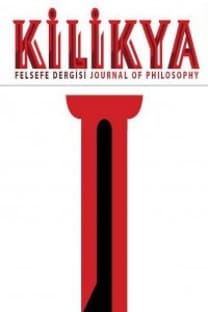Leibniz’in İndirgeme Planında Tasımsal Genleştirme
Geleneksel asertorik tasım kuramının, Aristoteles’in Birinci Çözümlemeler’inin ilk bölümlerine dayanan standart çıkarım planı, eksik geçerli kipleri tam/mükemmel kiplere indirgemek için bazı tek öncüllü dedüktif çıkarımları, yani dolaysız çıkarım ilkelerini kullanır. G. W. Leibniz, bu planın yerine, özü itibariyle yine Aristoteles’in tasımsal dönüştürme hakkındaki gözlemlerine dayanan,kendi tasımsal indirgeme örneğini koymaya girişenlerden birisidir. Leibniz’in indirgeme planında, dolaysız çıkarım ilkelerinin kendileri, geçerli tasımlar olarak modellenir (ve dolayısıyla onlar yoluyla gerekçelendirilir). Bu çalışma, dolaysız çıkarımların bu modellemesinin, yani tasımsal genleştirmenin, Leibniz’in (Nouveaux Essais’de betimlediği ve tasım hakkındaki yazılarından birinde sunduğu) tasımsal indirgeme planındaki yerini incelemekte ve bu inceleme yoluyla bütün bir indirgeme planının savunulabilirliğinin, aslında, kategorik önerme biçimleri için verilecek yoruma bağlı olduğunu göstermektedir.
Anahtar Kelimeler:
Tasım Kipi, Tasım Şekli, İndirgeme, Dolaysız Çıkarım, Leibniz
Syllogistic Expansion in the Leibnizian Reduction Scheme
The standard inferential scheme of traditional assertoric syllogistic, based on the initial chapters of Aristotle’s Prior Analytics, employs single-premissed deductions, i.e., principles of immediate inference, in the reduction of imperfect valid moods to perfect moods. G. W. Leibniz (among others) has attempted to replace this scheme with his own version of syllogistic reduction (the core of which is, again, based on Aristotle’s observations on syllogistic transformation), in which the principles of immediate inference themselves are modelled as (and hence justified by means of) valid syllogisms. This paper examines the place of this modelling, i.e. syllogistic expansion, of immediate inferences in Leibniz’s scheme of syllogistic reduction (which he describes in his Nouveaux Essais and presents in one of his papers on syllogistic), and shows through this examination that the tenability of the whole scheme actually hinges on the interpretation to be given for the categorical propositional forms.
Keywords:
Syllogistic Mood, Syllogistic Figure, Reduction, Immediate Inference, Leibniz,
___
- Aristotle (1963). Aristotle: Categories and De Interpretatione (J. L. Ackrill, Trans. & Notes). Oxford: Oxford University Press.
- Aristotle (2009). Prior Analytics: Book I (G. Striker, Intr. & Com.). Oxford: Oxford University Press.
- Belna, J.-P. (2014). Histoire de la Logique. Paris: Ellipses.
- Chenique, F. (2006). Éléments de la Logique Classique. Paris: L’Harmattan.
- Couturat, L. (1901). La Logique de Leibniz (d’après des documents inédits). Paris: Presses Universitaire de France.
- Detlefsen, M. & McCarty, D. C & Bacon, J. B. (1999). Logic from A to Z. London: Routledge.
- Klima, G. (2009). John Buridan. Oxford: Oxford University Press.
- Kneale, W. & Kneale, M. (1962). The Development of Logic. Oxford: Clarendon Press.
- Jacquette, D. (2016). Subalternation and Existence Presuppositions in an Unconventionally Formalized Canonical Square of Opposition. Logica Universalis, 10(2-3), 191-213.
- Lachelier, J. (1907). Études sur le Syllogisme (suivies de l’observation de Platner et d’une note sur le “Philèbe”). Paris: Librairie Félix Alcan.
- Leibniz, G. W. (1875-90). Die Philosophischen Schriften 6 (7 vols.) (C. I. Gerhardt, Ed.). Berlin: Weidmann. (Reprinted 1965, Hildesheim: Georg Olms).
- Leibniz, G. W. (1966). Logical Papers (G. H. R. Parkinson, Trans. & Ed.). Oxford: Oxford University Press.
- Leibniz, G. W. (1996). New Essays on Human Understanding (P. Remnant & J. Bennett, Trans. & Ed.). Cambridge: Cambridge University Press.
- Lenzen, W. (n.d.). Leibniz: Logic. In The Internet Encyclopedia of Philosophy. Retrieved from http://www.iep.utm.edu/leib-log
- Miller, J. W. (1938). The Structure of Aristotelian Syllogistic. London: K. Paul, Trench, Trubner & Co.
- Parsons, T. (2014). Articulating Medieval Logic. Oxford: Oxford University Press.
- Patzig, G. (1968). Aristotle’s Theory of the Syllogism (J. Barnes, Trans.). Dordrecht: Springer.
- Rescher, N. (1954). Leibniz’s Interpretation of His Logical Calculi. The Journal of Symbolic Logic 19(1), 1-13.
- Yayın Aralığı: Yılda 2 Sayı
- Başlangıç: 2014
- Yayıncı: Eray Yağanak
Sayıdaki Diğer Makaleler
Doğruluk Koşulu Bilginin Sarsılabilirlik Kuramları için Gereksiz midir?
Leibniz’in İndirgeme Planında Tasımsal Genleştirme
Sıradanlaşan Teknoloji: Bir Kötülük Deneyimine Doğru
Ontolojik Bağlamda Ockhamlı William Üzerine Bir Değerlendirme
Richard Rorty’de Dayanışma Umudu
Derrida’nın Cinsiyet Farklılığı Düşüncesi: Gelecek Olan Bir Erteleme Politikası
